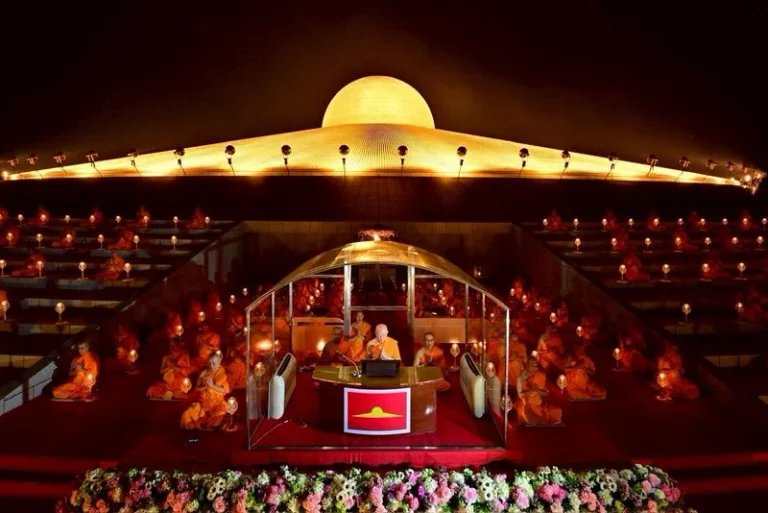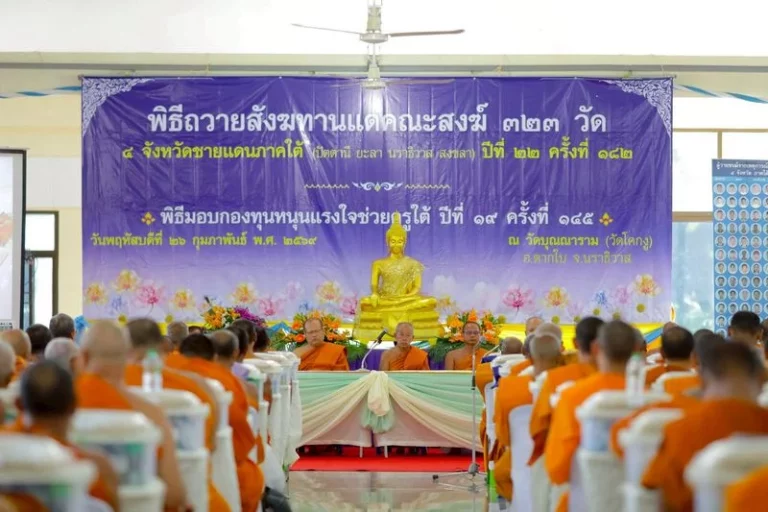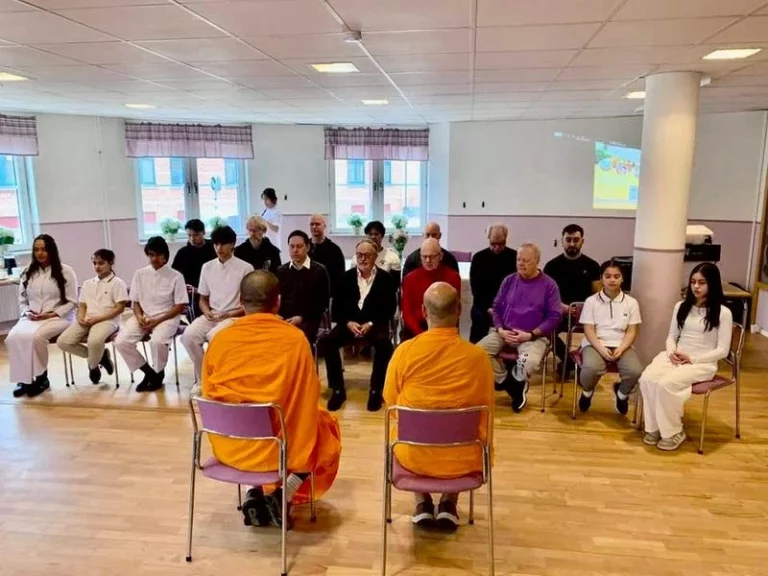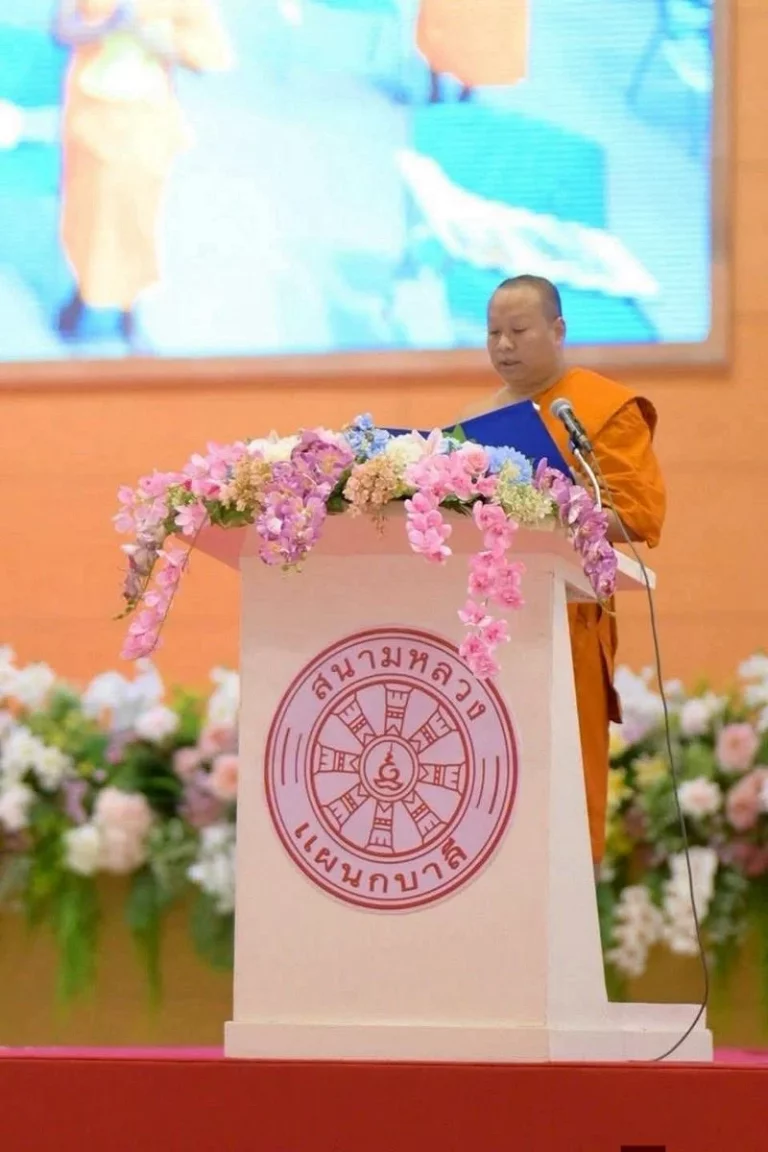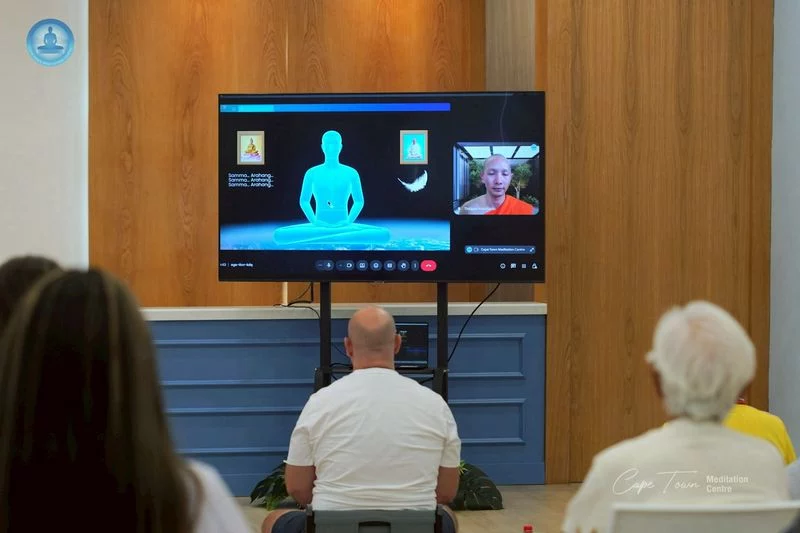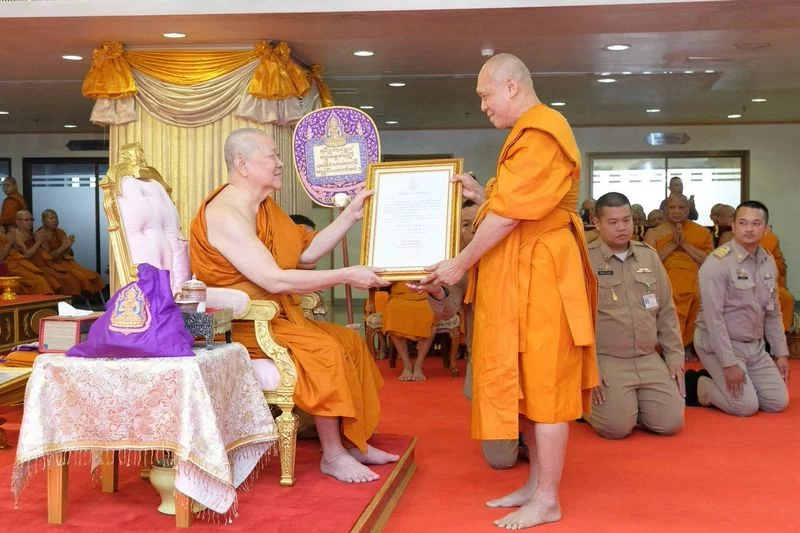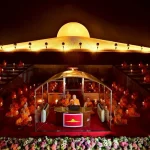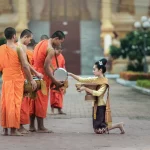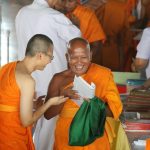As the 74th anniversary of the Most Venerable Phrarajbhavanajahn’s (Luang Por Dattajeevo) – Vice Abbot of the Wat Phra Dhammakaya, birthday approaches, it is of great honor and privilege for his disciples, comprised of venerable monks, novice monks, laymen and laywomen, and the general public, to recognize the benevolence and kindness of this magnanimous human being for his complete devotion to Buddhism and the vast knowledge he has imparted on us. His invaluable teaching is clear, precise, contemporary and grounded soundly on the principle of cause and effect. The teaching methodology and volumes of books he has penned, which illustrates to his exemplary nature, offer his audience and readership the technique and inspiration to continue improving themselves.
Using the Tipitika as his cornerstone, he has dedicated countless hours extensively researching Dhamma – the teachings of the Lord Buddha, in order to incorporate them in the countless lectures he has given and over a hundred books he has authored for the sole purpose of encouraging right view and virtues in the citizens of the world.
Most Venerable Phrarajbhavanajahn, in addition to his administrative duty of overseeing the temple affairs, has assumed the crucial role of teacher of Buddhism for over 40 years in his sterling monastic career. He has devoted his time to propagating Buddhism domestically and internationally, expounding on the Dhamma of the Buddha to monks, novice monks and the Buddhist communities so that they can practice it accurately. His works include countless Dhamma lectures, seminars, and a collection of Dhamma books that currently exceeds 140. His current teaching, “The Five Rooms of Life” – exploring the five major ‘rooms’ in everyone’s life that have the greatest influence in developing and shaping our habits, has been well received by teachers and students all over the country. It has provided insights and techniques to cultivate strong habits of cleanliness, organization, politeness, punctuality and meditation. The teaching can be easily applied to one’s life and can bring harmony and happiness into every family and individual of any gender and age, ultimately leading to virtuous and prosperous lives.

This December 2014, to acknowledge the 74th anniversary of the Most Venerable Phrarajbhavanajahn ’s birthday, a ceremony to commemorate this milestone will be held.
The Most Venerable Phrarajbhavanajahn was born Padej Pongsawat on 21st December 1940 (B.E. 2483) in Kanchanaburi Province. He graduated from Kasetsart University, Bangkok in 1968 with a Bachelor of Science in Agriculture and Animal Husbandry (B.E. 2510) and went on to earn a Diploma in Dairy Technology from Hawkesbury College in Australia.
Ordination
Mr. Padej Pongsawat was ordained on 19th December 1971 (B.E. 2514) at Wat Paknam Bhasicharoen in Bangkok with H.H. Somdej Phra Maharatchamongkhalachan (Venerable Chuang Worapunyo Bhikkhu, Dhamma, Pali Level 9), current abbot of Wat Paknam Bhasicharoen, as his preceptor. His monastic title is “Dattajeevo,” meaning “a person who has dedicated himself to Buddhism.”
Current Positions:
- Vice Abbot of the Wat Phra Dhammakaya
- Vice President of the Dhammakaya Foundation
- President of Dhammakaya International Society of North America and Europe
- Deputy Assistant to the Monastic Ambassador of the 8thRegion
- President of the Dhammadayada Training Program
Path in the Pursuit of Perfections
To chronicle the Most Venerable Phrarajbhavanajahn’s path in his pursuit of Perfections, excerpts from a booklet published on the occasion of his 60th birthday on 21st December 2000 (B.E. 2543) and passages taken from the chapter “Battling Mara” in his book Path to Happinessthat was published in 1969 (B.E. 2512) will be used. There are many interesting points found in these publications that deserve mentioning.
“…As a teenager, I loved practicing meditation; it started around 1947-1948 (2497-2498 B.E.) when I was in the 10th grade. The word meditation first piqued my attention as I was reading an ancient text Visudhimagga that was authored by Phraputakosajarn from around the year 457 (900 B.E.). I discovered this text because of my love of reading – it truly was my passion. I read all sorts of books and practically read every book in the Kanchanaburi Library. Once I finished this ancient text, I wanted to practice meditation; however, it was hard obtaining good results when you practiced on your own. Therefore, I was on a personal quest to find a meditation instructor, and through sheer coincidence I came across an instructor who was practicing meditation in order to advance his black magic. And being a teenager, I was automatically drawn to such techniques as immortality, heat resistance, and unlocking locks using magic. At that time, I wasn’t aware that this form of black magic belonged to the Dark Art. I thought it was part of the Wholesome Art because there were incantations extolling the virtues of the Triple Gem and Venerable Moggallana, one of the Lord Buddha’s chief disciples endowed with psychic powers.
I, too, thought I would incorporate this art solely for the benefit of the nation. Later when I mastered the immortality technique and was able to make my skin impenetrable by sharp objects, I falsely believed I had arrived on the right path.
However, I believed it was my good fortune from the past that allowed me to meet Luang Por Dhammajayo (Phrathepyanmahamuni), Abbot of the Wat Phra Dhammakaya, before I could have easily lost my way further. At that time, Luang Por Dhammajayo had not yet been ordained and was known as Mr. Chaiyaboon Suthipon. He was a fourth year university student and my junior. I still can recall precisely that it was Sunday, 27th November 1966 (B.E. 2509) – Loy Kratong Day (Floating Raft Day).
After Mr. Padej discovered that the younger Chaiyaboon Suthipon observed the Five Precepts, abstained from alcohol and practiced meditation, he was interested in meeting him and arranged for a meeting. They got along well once they began conversing, leading to Mr. Padej’s eagerness to impart his knowledge on the art of black magic, but only after determining Mr. Chaiyaboon’s Dhamma knowledge with a barrage of questions. Since Mr. Padej was highly versed in Dhamma, the screening involved a bombardment of questions to test Mr. Chaiyaboon’s knowledge and lasted until the morning hours that the Tipitika texts had to be retrieved for reference. Every question asked were answered with ease, making Mr. Padej unsure whether to accept Mr. Chaiyaboon as a pupil as planned because Mr. Chaiyaboon’s Dhamma knowledge far exceeded his. When Mr. Chaiyaboon was asked about heaven and hell, he answered clearly and was certain of their existence. He even indicated that there was an individual, a nun, who could visit heaven and hell. Her name was Khun Yai, Master Nun Chand Khonnokyoong and she was a disciple of Luang Por Wat Paknam Bhasicharoen (Most Venerable Phramongkolthepmuni, Sodh Candasaro).
“Before Luang Por Dhammajayo introduced me to Khun Yai, I had boasted about the special power of the Dark Art to him on numerous occasions. And as I said earlier, I had intended to take him as a pupil, but he showed no interest and instead pointed out to me the disadvantages of this crude and barbaric science and how it will only bring troubles to the practitioner later on. Instead, he praised the art that Khun Yai was teaching daily; however, I was still only interested in learning about heaven and hell.”
One day, Mr. Padej wanted to demonstrate a technique called ‘resistance to burning oil,’ so he invited all his friends to come watch. In prior demonstrations, whenever he dipped his hand into the hot oil pan, he never got burned or felt the heat. However, he noticed that when Mr. Chaiyaboon was present, he felt the extreme heat merely from passing his hand above the oil and had to withdraw his hand quickly. It made him curious whether Mr. Chaiyaboon possessed something special in him. Later on, he wished to test his ability to command liquid mercury by making it run into Mr. Chaiyaboon’s hand, but again he was unsuccessful. Some time later, he learned that Mr. Chaiyaboon was a meditation practitioner at Wat Paknam Bhasicharoen who practiced diligently until he attained the Dhammakaya (Enlightened Body) within.
Even renowned and well-known masters of the black magic were unsuccessful in demonstrating their skills when they performed their techniques in the presence of Mr. Chaiyaboon. The Dark Art proved ineffective and innocuous against the purity and power of the Wholesome Art. “…since that time, I had complete faith that the teachings and knowledge of the Lord Buddha was supreme and even learned that the Dark Art could lead one into hell. Therefore, I quit and abandoned the Dark Art entirely and surrendered all my texts so Khun Yai can incinerate them”…
“…a short explanation from Mr. Chaiyaboon: when compared, a person is like to a radio and meditation is like the receiver inside the radio.
If it is a good receiver, the frequency can be received clearly whether the source is a short or long wave originating nearby or from far away.
Choosing whether to receive the frequency sent from Mara or the Dhammakaya depends on the listener or where our mind wishes to tune into.”
From that point on, Mr. Padej accompanied Mr. Chaiyaboon to study meditation practice with Khun Yai, Master Nun Chand Khonnokyoong, at the Dhammaprasit House at Wat Paknam Bhasicharoen. Thereafter, he became one of the integral contributors in a community of pioneers who helped build the Dhammakaya Temple with the objectives set by the Most Venerable Phrathepyanmahamuni (Luang Por Dhammajayo), Abbot of the Wat Phra Dhammakaya, and guidance from his teacher, Master Nun Chand Khonnokyoong.
Once ordained as a Buddhist monk, Ven. Dattajeevo Bhikkhu was entrusted with the responsibilities in the area of teaching and training monks to become true monks and cultivating people to be virtuous people. Thus, this led to the establishment of many projects such as the Dhammadayada Training Program; training programs for soldiers, police officers, teachers, government officials from various departments, and many private companies. Furthermore, he is instrumental in the propagation of Buddhism through the development of domestic and international branch centers of the Wat Phra Dhammakaya. He has been working tirelessly on these tasks since the first year of his ordination, and at the age of 74 he shows no signs of slowing down.
The Most Venerable Phrarajbhavanajahn is a natural born teacher endowed with immense virtues and possesses the heart of a true and virtuous friend. He has given himself completely to Buddhism – dedicating his time to offering Dhamma lectures and writing over 140 exemplary books on Dhamma. These books on the precious teachings of the Lord Buddha have been translated into English, published, and converted into various media formats.
A list of some of the distinguished books that have been used as guidelines to living a virtuous life are 38 Blessings of Life; True Monks; Good Questions and Good Answers; Sekiyawat (The Origin of Mannerism in Thailand); Before Going to the Temple; Virtuous People the World Awaits; Pursuers of Perfections; Archetype of a Virtuous Individual; Buddhist Principles Relating to Political Science; Buddhist-Based Economics; Restoring the Nation after a Crisis; Warm-Hearted Family; Nurturing Your Child; Art & Science of Being A Good Teacher; and the biography of Ven. Phrapadej Dattajeevo Bhikkhu in various books about Master Nun Chand Khonnokyoong.
Generally, reading an exceptional book can give us a glimpse into the personality of the author. In the case of the Most Venerable Phrarajbhavanajahn who is worthy of our respect and honor, we can concur to his immense passion for Dhamma and lifelong dedication to Buddhism and its propagation. He is a true monk deserving our utmost reverence; a great teacher guiding his disciples towards the path to heaven and instilling the love for accumulating of merits and an abstention from performing misdeeds. Therefore, it is an auspicious opportunity for all his faithful disciples to gather together with our deepest respect to honor the anniversary of his 74th birthday by listening to a Dhamma sermon and offering reverence on Sunday, 21st December 2014, at the Wat Phra Dhammakaya in Pathum Thani Province.




